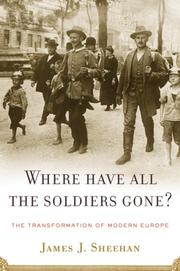| Listing 1 - 6 of 6 |
Sort by
|
Book
ISBN: 9782717855081 2717855084 Year: 2008 Publisher: Paris : Economica,
Abstract | Keywords | Export | Availability | Bookmark
 Loading...
Loading...Choose an application
- Reference Manager
- EndNote
- RefWorks (Direct export to RefWorks)
Geopolitics --- War --- Politics and war --- Géopolitique --- Guerre --- Politique et guerre --- Economic aspects --- Aspect économique
Book
ISBN: 9780674028302 0674028309 Year: 2008 Publisher: Cambridge, Mass : Harvard University Press,
Abstract | Keywords | Export | Availability | Bookmark
 Loading...
Loading...Choose an application
- Reference Manager
- EndNote
- RefWorks (Direct export to RefWorks)
Politics and war --- World War, 1939-1945 --- Politique et guerre --- 2ème guerre mondiale --- History --- Social aspects --- Histoire --- Aspect social --- Japan --- Japon --- Social conditions --- Conditions sociales

ISBN: 9780618353965 0618353968 Year: 2008 Publisher: Boston, Mass. Houghton Mifflin
Abstract | Keywords | Export | Availability | Bookmark
 Loading...
Loading...Choose an application
- Reference Manager
- EndNote
- RefWorks (Direct export to RefWorks)
Polemology --- History of Europe --- anno 1900-1999 --- War and society --- Politics and war --- Guerre et société --- Politique et guerre --- Europe --- History --- Economic conditions --- Defenses --- Histoire --- Conditions économiques --- Défense --- Guerre et société --- Conditions économiques --- Défense
Book
ISBN: 9782253121732 Year: 2008 Volume: 30981 Publisher: Paris : LGF,
Abstract | Keywords | Export | Availability | Bookmark
 Loading...
Loading...Choose an application
- Reference Manager
- EndNote
- RefWorks (Direct export to RefWorks)
World politics --- Politics and war --- Mass media --- Politique mondiale --- Politique et guerre --- Médias --- History --- Political aspects --- Histoire --- Aspect politique --- Italy --- Italie --- Politics and government --- Politique et gouvernement --- Médias

ISBN: 9780521817035 052181703X 9780511496301 9780521174145 9780511388613 0511388616 0511386613 9780511386619 0511496303 110717435X 1281254371 9786611254377 0511387628 0511384785 0511382952 0521174147 Year: 2008 Publisher: New York ; Cambridge : Cambridge University Press,
Abstract | Keywords | Export | Availability | Bookmark
 Loading...
Loading...Choose an application
- Reference Manager
- EndNote
- RefWorks (Direct export to RefWorks)
This is a major study of the ideas and practices involved in the making and breaking of peace treaties and truces from Classical Greece to the time of the Crusades. Leading specialists on war and peace in ancient and medieval history examine the creation of peace agreements, and explore the extent to which their terms could be manipulated to serve the interests of one side at the other's expense. The chapters discuss a wide range of uses to which treaties and other peace agreements were put by rulers and military commanders in pursuit of both individual and collective political aims. The book also considers the wider implications of these issues for our understanding of the nature of war and peace in the ancient and medieval periods. This broad-ranging account includes chapters on ancient Persia, the Roman and Byzantine Empires, Anglo-Saxon England and the Vikings.
Peace treaties --- Diplomacy --- Military history, Ancient. --- Military history, Medieval. --- History --- Politics and war. --- Europe --- Military history, Ancient --- Military history, Medieval --- Medieval military history --- Ancient military history --- Treaties of peace --- Peace --- Treaties --- War --- War and politics --- International relations --- Political aspects --- Arts and Humanities --- Peace treaties - History - To 1500. --- Diplomacy - History - To 1500.
Book
ISBN: 0801478375 0801458536 9780801458538 9780801446344 0801446341 1322503338 Year: 2008 Publisher: Ithaca : Cornell University Press,
Abstract | Keywords | Export | Availability | Bookmark
 Loading...
Loading...Choose an application
- Reference Manager
- EndNote
- RefWorks (Direct export to RefWorks)
Accidental harm to civilians in warfare often becomes an occasion for public outrage, from citizens of both the victimized and the victimizing nation. In this vitally important book on a topic of acute concern for anyone interested in military strategy, international security, or human rights, Alexander B. Downes reminds readers that democratic and authoritarian governments alike will sometimes deliberately kill large numbers of civilians as a matter of military strategy. What leads governments to make such a choice?Downes examines several historical cases: British counterinsurgency tactics during the Boer War, the starvation blockade used by the Allies against Germany in World War I, Axis and Allied bombing campaigns in World War II, and ethnic cleansing in the Palestine War. He concludes that governments decide to target civilian populations for two main reasons-desperation to reduce their own military casualties or avert defeat, or a desire to seize and annex enemy territory. When a state's military fortunes take a turn for the worse, he finds, civilians are more likely to be declared legitimate targets to coerce the enemy state to give up. When territorial conquest and annexation are the aims of warfare, the population of the disputed land is viewed as a threat and the aggressor state may target those civilians to remove them. Democracies historically have proven especially likely to target civilians in desperate circumstances.In Targeting Civilians in War, Downes explores several major recent conflicts, including the 1991 Persian Gulf War and the American-led invasion of Iraq in 2003. Civilian casualties occurred in each campaign, but they were not the aim of military action. In these cases, Downes maintains, the achievement of quick and decisive victories against overmatched foes allowed democracies to win without abandoning their normative beliefs by intentionally targeting civilians. Whether such "restraint" can be guaranteed in future conflicts against more powerful adversaries is, however, uncertain. During times of war, democratic societies suffer tension between norms of humane conduct and pressures to win at the lowest possible costs. The painful lesson of Targeting Civilians in War is that when these two concerns clash, the latter usually prevails.
Civilian war casualties --- Civilians in war. --- War victims --- War and society --- Politics and war --- Military history, Modern --- War --- War and politics --- Society and war --- Sociology --- Civilians in war --- Sociology, Military --- Victims of war --- Victims --- Casualties, Civilian war --- Civilian casualties of war --- War casualties --- History --- Political aspects --- Social aspects
| Listing 1 - 6 of 6 |
Sort by
|

 Search
Search Feedback
Feedback About UniCat
About UniCat  Help
Help News
News